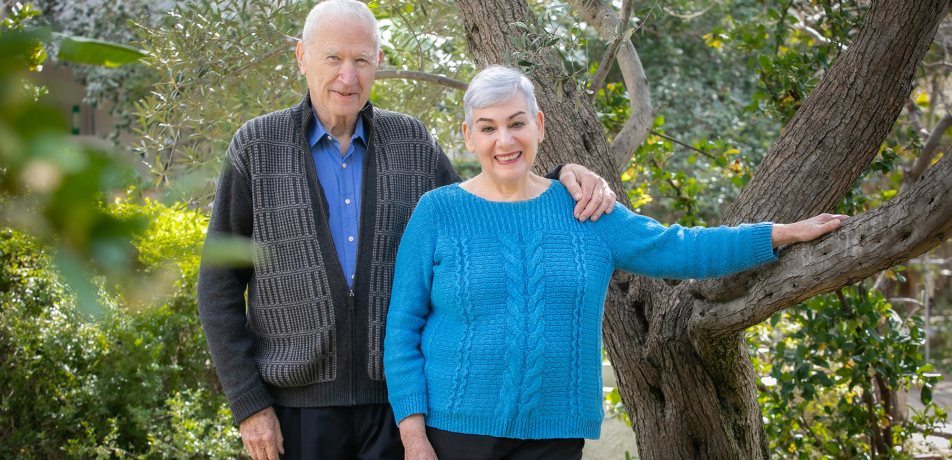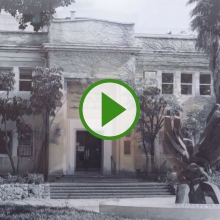The power of the sun
Yehuda and Dita Bronicki discuss their commitment to sustainable energy, industry, and education
People behind the science

Friends of the Weizmann Institute of Science in Israel Yehuda and Dita Bronicki say their relationship with Weizmann originated from the conviction that industry has much to gain from cooperating with research institutions and that research institutions can benefit from cooperation with industry.
Yehuda Bronicki was born in a region of Poland that is now part of Ukraine. There, as a young teen, he survived the Holocaust. After earning a BSc in engineering at the École Nationale Supérieure d’Arts et Métiers and an MSc in physics at the Sorbonne in Paris, he immigrated to Israel in 1958.
Dita was born in Israel and studied at the Hebrew University of Jerusalem. They have been married since 1961.
“I wanted to do something meaningful for industry in Israel,” Yehuda says in an interview at their home in Yavne, where they have lived since 1985. He identified solar energy as a sector that could achieve that goal. “Israel had no oil, no coal, almost no water,” he continues, “but an abundance of solar energy.”
When Yehuda arrived in Israel, he joined the National Physical Laboratory of Israel in Jerusalem, founded and managed by Dr. Harry Zvi Tabor with funding from the Prime Minister’s Office. Then-Prime Minister David Ben-Gurion supported solar energy and desalination research. There, Yehuda developed a power unit using Dr. Tabor’s solar collectors and patented the invention. However, funding for the development of the solar program was discontinued when Ben-Gurion left office. The government searched unsuccessfully for private companies that would continue developing the solar power unit.
“Dita and I decided to do it ourselves,” Yehuda says. In 1965, they sold their apartment in Jerusalem and set up Ormat Turbines Ltd. (later Ormat Industries) and acquired a small workshop in Tel Aviv with three employees. The workshop later moved to Yavne, where Yehuda’s father and his partner had a different kind of factory. Yehuda was allowed to use some space in that plant and worked on a new type of turbine, while the young Ormat company manufactured various metalwork products to pay the bills.
Clean energy
Ormat would go on to become a world leader in clean, renewable geothermal energy, long before those terms were even part of the popular lexicon and even before the oil crisis of the 1970s brought attention to the geopolitical risks of dependence on fossil fuels. Both Yehuda and Dita managed the company and its subsidiaries for 50 years, from its founding until 2014.
Although the Bronickis have stepped down from the helm of Ormat, the company is still flourishing. It now employs some 1,400 workers and its equipment is producing clean energy in 30 countries.
“Today, the urgency of environmental sustainability is clear, but Dita and Yehuda Bronicki were pioneers who saw the need early on and led the way in the field of clean, renewable energy in Israel. We share their passion for ensuring a sustainable future for Israel and are grateful for their generosity to the Weizmann Institute and to the Davidson Institute, where they play a leading role in promoting science education and making science accessible to all,” says Weizmann President Prof. Alon Chen.
Making science accessible
While many people talk about the importance of education, few take the step of founding schools. But five years after launching Ormat, the Bronickis opened a vocational high school adjacent to the factory in Yavne that still operates under the auspices of the ORT network of trade schools. The school was intended to provide a second chance for students who drop out of the regular public school system.
“These kids who would have dropped out can fulfill their potential and succeed,” Dita says.
They both feel that “technical capabilities aren’t given the place they deserve in the Israeli [educational] structure.”
The Bronickis are also active members in an NGO called Tovanot B’Hinuch (Insights in Education) that helps raise the level of struggling public schools in Israel’s geographic or social periphery.
“Tovanot B’Hinuch turns these schools from ‘red-listed’ by the Education Ministry into successful schools and some even reach the upper deciles of scholastic achievement,” Dita explains.
The Bronickis are deeply committed to and involved in the projects they support at the Davidson Institute of Science Education, the science literacy arm of the Weizmann Institute. One is TIMAR, which brings Jewish and Arab children in Israel together through agricultural teaching programs on working farms.
“We think that in the current social reality, we need to bring those kids together from a young age. Hatred is growing, but if you’ve met ‘the other’ and aren’t afraid of them, you won’t hate them, either. That’s what we hope,” Dita says.
Another Davidson program the Bronickis support is iScientist, which has been running for six years and lets students from all over Israel video chat with leading scientists in Israel, including at the Weizmann Institute. Through this program, classroom science teachers are trained to facilitate a direct dialogue between pupils and researchers.
The couple has also funded Science VOD, an online library of interactive videos on scientific topics produced at the Davidson Institute, as well as the translation of these videos into Arabic.
Dita says, “We thought that was important, and it’s been successful. There are large numbers of viewers.” Not all the viewers of the Arabic-language science videos are Arabic speakers in Israel—the content is also being watched in several Arab countries.
“The online programs are another very important way of making science accessible to a population that doesn’t have access to it at home,” Dita explains. Davidson Institute CEO Dr. Liat Ben-David calls the Bronickis’ experience and creativity “invaluable assets.”
“They know how to be involved without interfering, and we highly respect each other. This approach is effective and fruitful,” Dr. Ben-David observes.
Years ago, the Bronickis also supported a visual education project in kindergartens based on a method developed by renowned Israeli artist Yaacov Agam. The project, implemented by the Weizmann Institute’s Department of Science Teaching, teaches young children to identify and distinguish different shapes. “Visual education is very important in engineering studies,” says Yehuda.
The fundamentals
The Bronickis also support the heart of Weizmann’s work—basic research. A notable recent project was the construction of Prof. Nachum Ulanovsky’s bat tunnel on the Weizmann campus. Prof. Ulanovsky studies learning, memory, and spatial navigation in the Department of Brain Sciences and the bat tunnel is carefully designed to track bats’ navigational abilities at high speed. This tunnel is expected to generate insights into neurological deficits in spatial navigation and memory and is already bearing fruit. Prof. Ulanovsky and his team have made two important discoveries about neural coding, published in the journals Science and Nature in 2021 and 2022, respectively.
Prof. Ulanovsky explains that “Yehuda and Dita’s support has allowed us to conduct the first-ever studies of how the brain represents truly large environments—the first such studies in any organism and any brain region.”

A bat from Prof. Nachum Ulanovsky’s research tunnel. Studies at the bat tunnel, supported by the Bronickis, have generated important insights into neural coding.
A helping hand
Beyond strengthening Israel by advancing education and basic science, Weizmann contributes to Israel’s economy by allowing its scientists to consult on problems facing ventures in the industrial sector. The Institute contributes to research and development for the defense industry, as well as for small companies.
In fact, the need for scientific expertise led to the Bronickis’ first encounter with the Weizmann Institute. In the early 1970s, Ormat was having technical difficulties operating its turbines in Alaska because the liquid in the turbines would freeze in the extreme cold. Yehuda contacted Prof. Amnon Yogev, then a young scientist at the Institute whom Yehuda knew from when they had both worked at the National Physical Laboratory.
In a matter of days, Prof. Yogev came up with an elegant solution—he mixed two isomers (different atomic arrangements of the same molecular structure) of the fluid, lowering its freezing point without impacting its other properties. This meant that no changes to the system had to be made. This development resulted in substantial export orders for Ormat.
The Bronickis have now been friends of the Weizmann Institute for decades. Yehuda is a Life Member of the International Board and a Member of the Executive Board. The couple were inducted into the President’s Circle in 2018, the same year they were awarded the Israel Prize for Industry, the country’s most prestigious award for lifetime achievement. Over the years, they’ve seen Weizmann grow and change.
Speaking from the perspective of a successful business founder, Yehuda admires how the Institute is managed. Weizmann’s senior leaders are themselves active research scientists because the Institute believes that scientists can best direct the affairs of an academic body devoted to basic research. According to Yehuda, Weizmann’s scientist-presidents have always demonstrated “simply outstanding” management, including financial management.
The Bronickis hope to see the Weizmann Institute continue to flourish and progress, while bringing Israeli scientists working abroad back home to Israel.
Yehuda: “Everything they do at the Institute just keeps improving.”
Dita: “We want Weizmann to stay focused on educating the next generation.”








